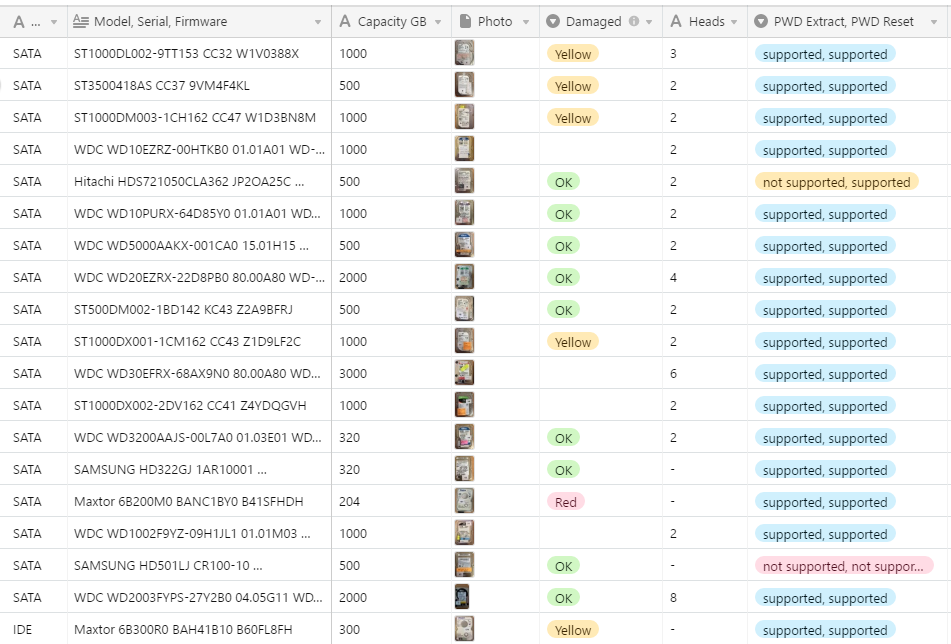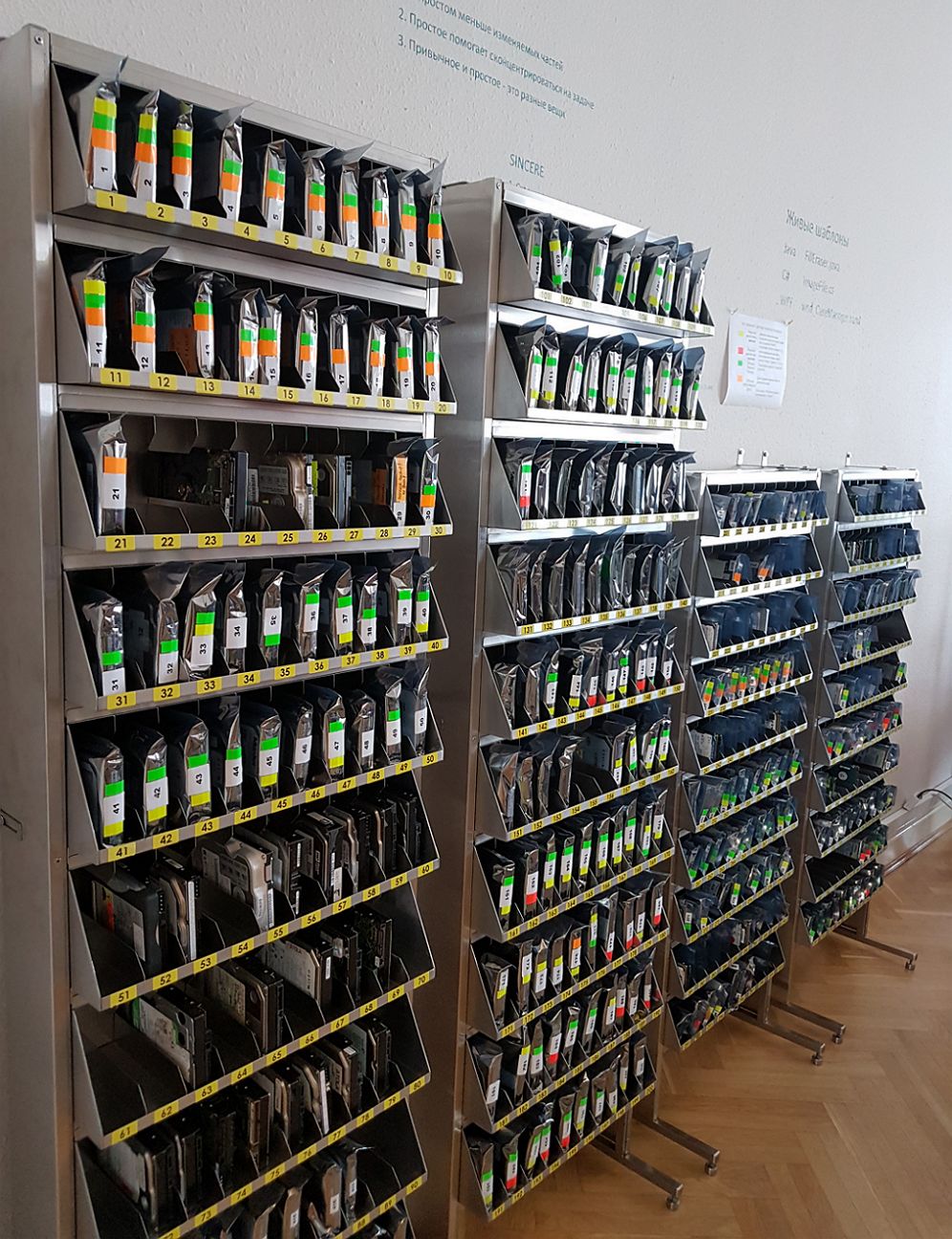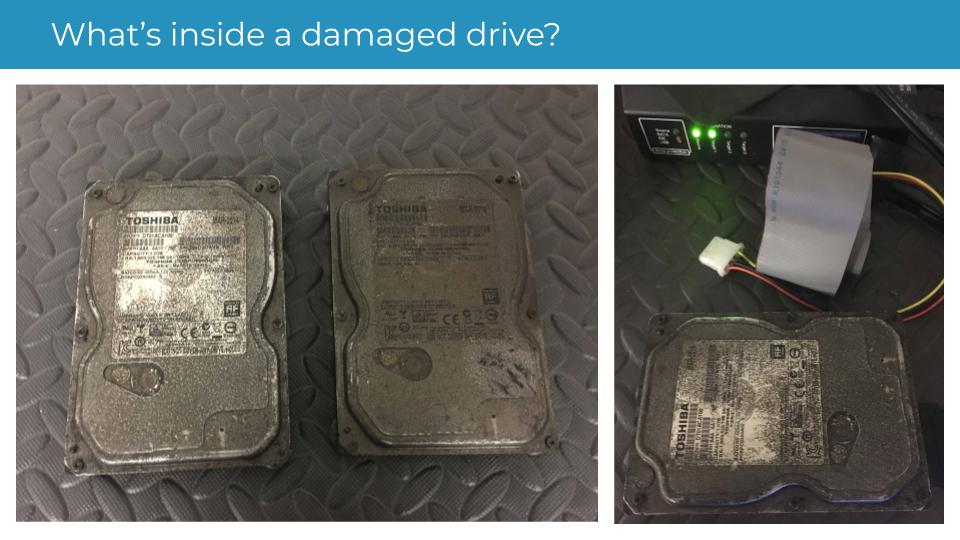Recent article about QA process for our devices on LinkedIn blog:
Today we are offering you a sneak peek into Atola Technology office to show you our device storage system.
As you know, both Atola TaskForce and Atola Insight Forensic support the vast majority of 1.8-inch, 2.5-inch, 3.5-inch IDE, SATA and USB hard drives, USB Flash media as well as SD, Compactflash, and Memory Stick cards. Over the years, we have accumulated hundreds of devices to develop and test our systems on them. Some of the drives date back to 2003, when the company was founded, others were purchased or donated more recently.
Many are damaged, yet they are precious to us: we actually bought most of them in this condition to make sure our acquisition systems are equal to the challenge of imaging such devices.
Each device has a unique history with us, so from the early days, we have had a database listing the drives and documenting their specifications, origin, condition and contents. Airtable allows adding various details including pictures of actual devices to help us quickly find the most appropriate drive for our purposes.

But the fact that the drives were stored in boxes sorted by a few rough criteria made finding devices a challenging task. At one point we realized we needed to have an efficient storage system in place, which would help us store the drives correctly and locate them efficiently. And no generic solution would suit us. So we hired a company to design and produce it for us. That is how this beauty came into existence:

Drive database to test Atola devices
Each drive has a number, is stored in a static-shielding bag tagged with colored stickers to help immediately identify the condition of a drive if you need to grab an appropriate drive quickly without checking the database. Our team members each have a set of tokens with their names that must be left in place of the drives when they are removed from their cells. All for easy tracking of the drives and their whereabouts.
- Top digital forensic conferences in 2024 - January 1, 2024
- 2023. Year in Review - December 31, 2023
- Top digital forensics conferences in 2023 - January 1, 2023
Yulia Samoteykina
Director of Marketing Yulia believes that with a product that is exceptionally good at solving tasks of forensic experts, marketing is about explaining its capabilities to the users. Yulia regularly represents Atola at DFIR events, holds free workshops and webinars about Atola imagers functionality and advocates on the users' behalf to ensure that Atola keeps on adding value and raising the bar for the industry.

4 Comments
kenman · December 14, 2018 at 4:37 pm
I love it! It’s like a book case for storage drives. After using it for a while, do you see anything you’d like to improve upon it?
Vitaliy Mokosiy · December 20, 2018 at 11:50 am
Terrific question! I’ve just realized it is that rare thing that did not receive any improvement ideas. Works flawlessly, everybody likes it including the recent newcomers.
Nevertheless, your questions touch the topic of an iterative approach. Our team is very focused on iterative analysis and improvements of practices we use. So, therefore, I am wondering that the drive database has been remaining with no changes since the very start. It looks like it fits greatly all the interactions we have.
It Bd44 · April 4, 2021 at 4:54 am
I have macbook ssd hard drive it’s locked user Lock it’s possible password recovery
Vitaliy Mokosiy · April 5, 2021 at 2:56 am
Our systems do not support unlock of MacBook SSDs. The only thing I can recommend so far is Sumuri Recon ITR. You could contact Sumuri and figure out if their solution could help: https://sumuri.com/